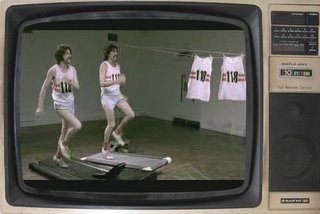Hachette, already the largest publisher in France and New Zealand, and the second largest in the United Kingdom, Australia and Spain, is now the third-largest publisher in the world with today's aquistion of Anglo-American publisher Time Warner Books. The two largest book publishing groups in the world remain the UK's Pearson (Penguin, etc.) and Germany's Bertelsmann (Random House, etc.). Man, if people read books, Europe would control the world!
Speaking of ruling the world, let's talk about about media concentration. After the Vivendi Universal débâcle, Hachette owned such a large share of the publishing market in France that the European Union had to step in and force it to sell off some of its publishing empire. It remained nonetheless the largest French publisher by a comforable margin. American publisher André Schiffrin, the longtime head of Pantheon Books (before they were aquired by Random House and he was eventually forced out), addresses the problems of media concentration and the aquisition of publishers by large conglomerates in his three books L'édition sans éditeurs, The Business of Books and Le contrôle de la parole (all are highly recommened!). He explains the enjeux much better than I can, but I'll briefly convey my issues with the way things are headed.
The first problem is that big business that don't understand publishing expect every book to make a profit. They simply see their shiny new book business as a touch of class and a new profit centre. They are unaquainted with the traditional model of publishing in which a publisher's most successful titles subsidize those that meet with less initial success. Some books will lose money. This is done because it is thought that while an author's first book might not make money, if his career is nutured they can profit from the talent they know he has (they would publish authors they believe in, not rubbish ones that they think might earn them a quick profit) as his reputation grows. They grow his audience, and then the audience will come back and buy his backlist. There was some sense that a book was not just a commodity like another, that it had some value beyond the money it could bring in. Hence, some books would be published simply because the content was deemed to be important, regardless of the potential for profit, present or future. Gallimard is a prime example of this practice, and today they hold the position of the largest independent publisher in France. It has been said that they have the best backlist in the world (Proust, Camus, Gide, Sartre, Cocteau, Beauvoir, etc). All of this is releated to the French concept of the exception culturelle, that culture should somehow be treated differently and not entirely left to the market.
The second problem is that as publishers are bought up and grouped together, there are fewer people deciding on which books will eventually make it into the shops. They could still be making the great decisions and publishing great books. The fact that the power to make those decisions are concentrated in fewer and fewer hands will be reflected in the resultant output. A narrower range of voices get through and the public debate suffers.
All of this having been said, and keeping in mind that I do realise that when we are dealing with huge publicly-traded companies nationality doesn't matter, part of me (the incorrible europhile I suppose) is somehow reassured by the fact that it's Europe that's building these great publishing empires. Hopefully this is less an end to democracy and more a first step to Mark Leonard's better, brighter future.
07 February 2006
Media Concentration in Publishing Marches On
What's the 411, yo?
I've been listening to On va s'gêner (heard weekdays on Europe 1) quite a bit these days, especially now that it's available as a podcast. When you listen to this daily ninety minute programme, you always seem to hear two or three amusing adverts for the telephone number 118 218, which is a Directory Assistance service in France; an equivalent of our North American 411 if you will. Hearing that advert reminded me of the 118 fiasco that I had heard them talk about on BBC Radio 4 back in 2003 without really knowing what they were talking about.
What could possibly be interesting about Directory Assistance (or Directory Enquiries as the service is known in the UK) you ask? Well, for a normal person, probably nothing. But since I'm not normal I'm going to tell you all about it. Here in North America we dial 411 to find a telephone number. In France you would dial 12 for France Télécom's Renseignements Téléphoniques, and in the United Kingdom you would dial 192 for British Telecom Directory Enquiries. Simple. But these services, and others elsewhere in Europe were monopolies of the (former or current) state-owned telecom providers, so along came a big, bad European Directive which apparently imposed the deregulation and liberalisation of the Directory Enquiries system across the European Union, and also required that 118 be used as the standard prefix for all such services. Lotteries were held in different European countries to allocate these 118 numbers (theoretically 1000 numbers per country are possible: 118 000 to 118 999).
This was first implemented in the United Kingdom in late 2003, and apprently caused all sorts of problems, most notably higher costs and worse service for consumers. Even before the changeover and ensuing fiasco, the mourning for the old 192 service had begun. By mid-2004, there were over 120 different UK 118 numbers people could call for directory enquiries, including 118 118, whose adverts I find hilarious, malgré moi. This chappie, however, did not find them quite as hilarious, so the adverts were pulled and the concept has been reinvented as a 1970s cop show parody. Currently, the deregulation is being implemented in France. 118 numbers are being launched and the old 12 serivice will be discontinued by spring. This is of course where my radio adverts for 118 218 come in. They have this sort of disco music in the background, and this bloke called 118 is talking to this other bloke called 218, and it's so ridiculous that I can't help but find the whole thing hilarious. Now I see they've got a website, equally hilarious telly adverts, a blog, and a real-life national TouTouYou-Tour (the chorus of the disco jingle is not so much a lyric as a sound that would be written out phonectically as 'toutouyoutou').
Currently, the deregulation is being implemented in France. 118 numbers are being launched and the old 12 serivice will be discontinued by spring. This is of course where my radio adverts for 118 218 come in. They have this sort of disco music in the background, and this bloke called 118 is talking to this other bloke called 218, and it's so ridiculous that I can't help but find the whole thing hilarious. Now I see they've got a website, equally hilarious telly adverts, a blog, and a real-life national TouTouYou-Tour (the chorus of the disco jingle is not so much a lyric as a sound that would be written out phonectically as 'toutouyoutou').
Both the Bristish and the French adverts seem equally ridiculous and very similar in nature (vaguely 1970s-looking dodgy chappies with moustaches and silly sports gear doing silly things). At first I thought plagiat!, but it turns out that The Number, which runs 118 118 in the UK, and Le Numéro, which runs 118 218 in France, are the same company. It's interesting that they would use virtually the same adverts in both countries, but it seems to work. Currently, Le Numéro is taking France Télécom to court, accusing them of unfairly withholding information from their directory database and favouring their own directory enquiries service.
I find the whole whole affair, i.e. the reckless deregulation, the lotteries, the fiasco and the ridiculous adverts (not forgetting the offended distance runner) hopelessly amusing.
06 February 2006
Canadian Provincial Cabinet Sworn In
Without making a qualitative judgement one way or the other, the new Harper cabinet seems rather provincial, doesn't it? Provincial in two ways.
Provincial (adj.): of or concerning the regions outside major urban centres. There are only three such centres in Canada, and there is no minister in the new cabinet who was elected in either Toronto, Montreal or Vancouver under the Conservative banner.
Also, using the word in the context of the Canadian federation, many of the new ministers have formerly been provincial cabinet ministers or have worked in provincial government. My list includes:
Jim Flaherty (Ontario)
Vic Toews (Manitoba)
John Baird (Ontario)
Tony Clement (Ontario)
Stockwell Day (Alberta)
Loyola Hearn (Newfoundland & Labrador)
Lawrence Cannon (Quebec) as ministers,
and
Rona Ambrose (Alberta)
Josée Verner (Quebec) as having worked in or for provincial governments.
Hopefully this will reduce the squabbling between the two different levels of government that sometimes makes us wish a for a more centralised state (until we come back to our senses of course).
Winnipeg Wants In
Forget about The West Wants In. Winnipeg Wants In. For as long as I've been old enough to follow politics, the Liberals were never stingy on cabinet seats for Winnipeg. You get accustomed to a certain level of representation, y'know? Well here we are. Sure, only 35% of us voted Conservative, but they still got the plurality of seats in Winnipeg (tied with the NDP). I've never seen that happen before. Granted, my political memories go back only as far as 1993, but still, it's noteworthy. What do we get in return from Stephen Harper? Zero cabinet seats. Outrageous!
Business as Usual in Ottawa
New Conservative government sworn in today:
Liberal David Emerson crosses the floor to join the Conservatives as a minister, before the first meeting of parliament. In other words, he won't even sit once in the house for the party for which he was elected in this parilament.
Unelected Michael Fortier who, admittedly, seems like quite a good sort, is appointed to the senate and joins the cabinet.
I'm sure they'll put Robert Nicholson, minister for Democratic Reform, on the case.
05 February 2006
Brisa Roché
On Wednesday's On a tout essayé (seen weekdays in France on France 2 and in Canada on TV5), we were introduced to The Chase, Brisa Roché's wonderful début record. She's originally from California, but now lives in Paris. The record is out on Blue Note, but only in France. In his review on the show, Jean-Bernard Hebey put forward that she can't sing, composes insipid melodies, and will therefore appeal to the pseudo-intellectuals who read Télérama (I must admit, I do recognise myself in that description).
They played the video (WMV or YouTube) for the song Mystery Man, and it was bloody brilliant! I don't know what he was on about... While we wait for a North American release, here are six tracks from the record for your listening pleasure:
Enjoy!
04 February 2006
What's it all about?
A blog, yeah? Everyone's had one for like ever, right? So what's the point of this one? I just feel like I should be doing something. So I'm doing this. For now. I'm probably just going to write about the books I read, the music I listen to and the films I see. Also, there'll be stuff about technology, Canada, its politics, life in Winnipeg (where as you can see even people who aren't Jesus walk on water), and Europe seen from here. That place is bloody fascinating. There'll be posts in French too. Yes, I am that pretentious. Either that, or I just want to make sure Canadian taxpayers get their money's worth for having spent thirteen years teaching me the language.
Stick with me kids, and everything will be just fine.
Toodle-oo!





